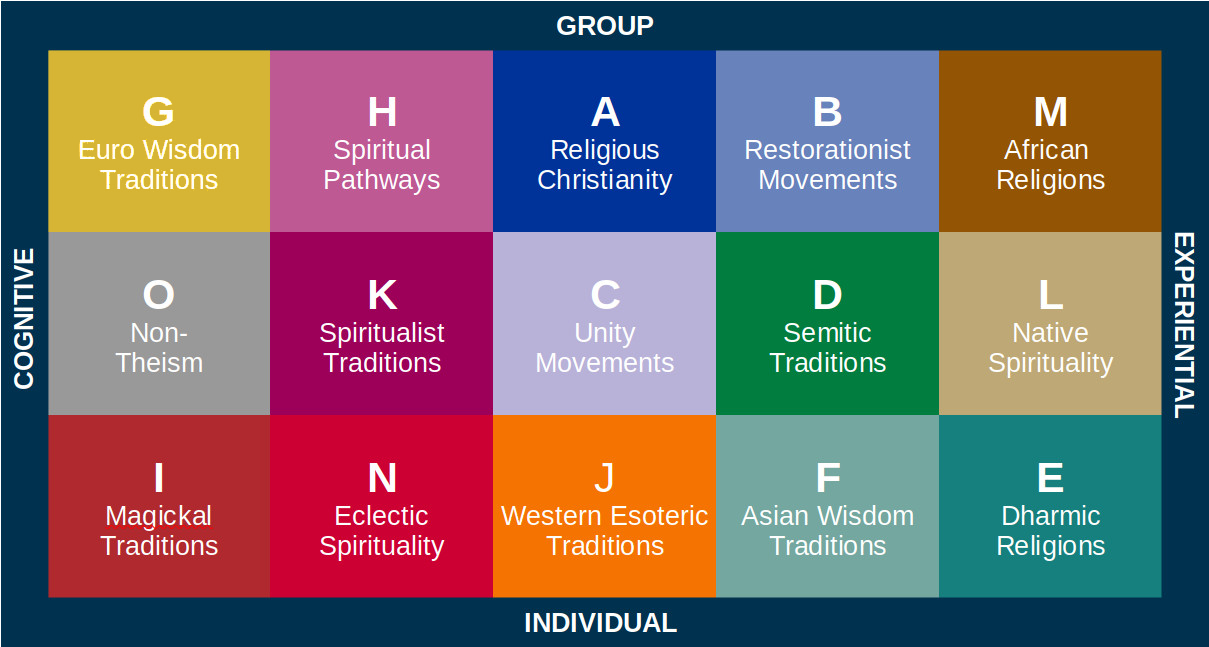Perspectiva Worldview Clusters
Click on the links to go to the worldview cluster profile.

The Term Lifeway
The term “lifeway” is a generalized and informal term used in various disciplines, such as sociology, cultural anthropology, social psychology, and even archaeology, to describe and analyze how individuals and groups live their lives, including their customs, practices, beliefs, and behaviors.
Lifeway Cultural Dimensions
A person’s approach to life in terms of cultural dimensions is a deeply personal and multifaceted approach to understanding one's existence, purpose, and connection to the broader universe. It encompasses a range of beliefs, practices, and experiences that guide an individual's relationship with the divine, the transcendent, or the sacred (or the denial of divine existence), as well as their place within a group of others with similar lifeway perspectives.
Religiosity
Religiosity refers to the extent to which an individual adheres to and participates in organized religious traditions and practices. For some, religiosity is central to their orientation to life, and they find meaning, purpose, and moral guidance within the confines of established religious institutions. These individuals may regularly attend religious services, observe rituals, and draw their ethical framework from the teachings of their faith. Religiosity often provides a structured and communal context for spirituality, fostering a sense of belonging and shared belief among its adherents.
Spirituality
Spirituality, on the other hand, represents a more personal and subjective dimension of an individual's orientation to life. It involves a quest for transcendence, inner peace, and a deeper understanding of existence beyond the confines of organized religion. Those with a strong spiritual orientation may engage in practices like meditation, prayer, yoga, or mindfulness to cultivate a direct connection with the divine or their inner selves. Spirituality often embraces a broader perspective, allowing individuals to draw inspiration and insight from various religious and philosophical traditions, as well as nature and the cosmos.
Lifeway Cultural Orientations
Group-Oriented Lifeways
A group orientation to life in terms of religiosity represents a communal approach to understanding the divine, seeking meaning in existence, and preserving a profound attachment to religious and cultural heritage. This orientation emphasizes the collective aspects of religious practice, fostering a sense of unity and shared purpose within a religious community.
Individual-Oriented Lifeways
An individual orientation to life, with a central focus on spirituality, represents a deeply personal and holistic approach to understanding one's existence. Within this orientation, emotional and aesthetic experiences play a profound role in shaping one's spiritual journey, while morality serves as a guiding framework anchored in values and norms.
Cognitive-Oriented Lifeways
A cognitive orientation to life in terms of religiosity and spirituality represents an approach characterized by intellectual exploration, analytical inquiry, and the pursuit of reasoned understanding in matters of faith and transcendence. This orientation affects both meaning-making and the connection with transcendence, as well as spirituality's interface with emotional and aesthetic experiences.
Experiential-Oriented Lifeways
An experiential orientation to life in terms of religiosity and spirituality is a deeply immersive approach that places a premium on personal experiences, direct encounters with the divine or the sacred, and the transformative power of spirituality. This orientation not only influences an individual's attachment to their religious and cultural heritage but also profoundly shapes their moral and behavioral dimensions, turning values and norms into lived principles.